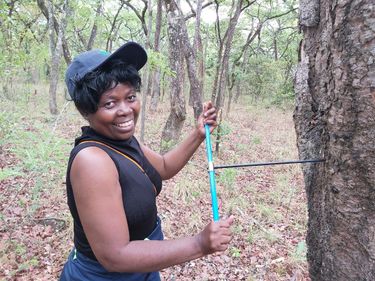
Sessions in which Valerie Trouet participates
Tuesday 28 June, 2022
Climate extremes are driven by a combination of thermodynamical and dynamical factors. In Europe, the primary dynamical driver of summer climate extremes is the position of the jet stream over the Europe-North Atlantic (EU) region. To study long-term variability in the position of the EU jet, as well as its potential impact on past climate extremes and human systems, we have reconstructed EU jet variability over the past 800+ years (1200-2005 CE). To accomplish this, we have combined five ...
Sessions in which Valerie Trouet attends
Tuesday 28 June, 2022
Africa is faced with a number of challenges including climate change and ecological disturbance due to various anthropogenic activities. These problems adversely affect the forests and also ecosystem services. My appreciation for the forests motivated me to pursure my undergraduate studies in Forestry. I first applied dendrochronology during my PhD research which focused on understanding the climate change vulnerability of the Zambezi teak forests in Zambia. However, lack of research facil...
Tree-ring time series provide long-term, annually resolved information on the growth of individual trees. However, public tree-ring archives contain a considerable portion of data collected from trees that have been selected with specific research questions in mind (e.g., for climate reconstruction). This makes these archives a biased representation of the sensitivity of forest ecosystems to ongoing climate variation (e.g. temperature, precipitation), including non-stationarity (i.e....
Tree-ring time series provide long-term, annually resolved information on the growth of individual trees. However, public tree-ring archives contain a considerable portion of data collected from trees that have been selected with specific research questions in mind (e.g., for climate reconstruction). This makes these archives a biased representation of the sensitivity of forest ecosystems to ongoing climate variation (e.g. temperature, precipitation), including non-stationarity (i.e....
Wednesday 29 June, 2022
Dendrochronology is considered one the most precise of all the scientific dating techniques. However, it requires long sequences of tree rings and a master record for both the species and region in question. At the University of Groningen, we have been pioneering a new approach to dating that combines the precision of dendrochronology with the versatility of radiocarbon dating. It relies on the detection of spikes in the annual radiocarbon record, thought to b...
Information garnered from historical timbers and wooden artifacts (e.g. houses, barns, ships) can greatly enhance our understanding of human, ecological, and climate history, especially in regions where few old-growth forests and trees remain, tree longevity is relatively short (less than 300-400 years), and environmental conditions break down wood rather quickly, like in mesic to wet regions. Over the last decade plus, the application of tree-ring techniques on wo...
Rescheduled from June 28th to June 29th

